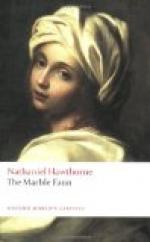“Why should you love me, foolish boy?” said she. “We have no points of sympathy at all. There are not two creatures more unlike, in this wide world, than you and I!”
“You are yourself, and I am Donatello,” replied he. “Therefore I love you! There needs no other reason.”
Certainly, there was no better or more explicable reason. It might have been imagined that Donatello’s unsophisticated heart would be more readily attracted to a feminine nature of clear simplicity like his own, than to one already turbid with grief or wrong, as Miriam’s seemed to be. Perhaps, On the other hand, his character needed the dark element, which it found in her. The force and energy of will, that sometimes flashed through her eyes, may have taken him captive; or, not improbably, the varying lights and shadows of her temper, now so mirthful, and anon so sad with mysterious gloom, had bewitched the youth. Analyze the matter as we may, the reason assigned by Donatello himself was as satisfactory as we are likely to attain.
Miriam could not think seriously of the avowal that had passed. He held out his love so freely, in his open palm, that she felt it could be nothing but a toy, which she might play with for an instant, and give back again. And yet Donatello’s heart was so fresh a fountain, that, had Miriam been more world-worn than she was, she might have found it exquisite to slake her thirst with the feelings that welled up and brimmed over from it. She was far, very far, from the dusty mediaeval epoch, when some women have a taste for such refreshment. Even for her, however, there was an inexpressible charm in the simplicity that prompted Donatello’s words and deeds; though, unless she caught them in precisely the true light, they seemed but folly, the offspring of a maimed or imperfectly developed intellect. Alternately, she almost admired, or wholly scorned him, and knew not which estimate resulted from the deeper appreciation. But it could not, she decided for herself, be other than an innocent pastime, if they two—sure to be separated by their different paths in life, to-morrow—were to gather up some of the little pleasures that chanced to grow about their feet, like the violets and wood-anemones, to-day.
Yet an impulse of rectitude impelled Miriam to give him what she still held to be a needless warning against an imaginary peril.
“If you were wiser, Donatello, you would think me a dangerous person,” said she, “If you follow my footsteps, they will lead you to no good. You ought to be afraid of me.”
“I would as soon think of fearing the air we breathe,” he replied.
“And well you may, for it is full of malaria,” said Miriam; she went on, hinting at an intangible confession, such as persons with overburdened hearts often make to children or dumb animals, or to holes in the earth, where they think their secrets may be at once revealed and buried. “Those who come too near me are in danger of great mischiefs, I do assure you. Take warning, therefore! It is a sad fatality that has brought you from your home among the Apennines,—some rusty old castle, I suppose, with a village at its foot, and an Arcadian environment of vineyards, fig-trees, and olive orchards,—a sad mischance, I say, that has transported you to my side. You have had a happy life hitherto, have you not, Donatello?”




